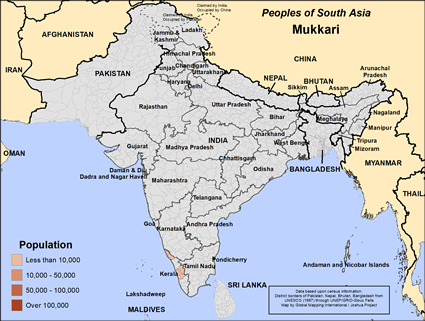The Malayalam-speaking Hindu Mukkari people live primarily in the southwestern Indian state of Kerala. Historically, they have been involved in agriculture and fishing, two industries closely tied to Kerala's coastal geography and fertile lands. Over time, the Mukkari people have adapted to economic changes in the region, though many families still rely on traditional occupations for their livelihood.
The Mukkari people depend on both agriculture and fishing to support their families. They cultivate crops such as rice, coconut and spices which thrive in Kerala's tropical climate. Fishing also plays a significant role in their economy, with some Mukkari families earning their income through coastal and inland fishing. Many families work together, sharing responsibilities in farming and fishing, while others have found employment in nearby towns or cities.
Mukkari villages consist of close-knit communities, with extended families living near one another. Homes are typically built from locally sourced materials such as brick, wood and thatch, reflecting the region's climate. Life in the villages revolves around farming, fishing, religious observances and family activities. Although younger members of the community often seek education and job opportunities in urban centers, many return to their villages during harvest or fishing seasons to assist their families.
The Mukkari people follow Hinduism, and religion plays a central role in their lives. They worship deities such as Vishnu, Shiva and local gods and goddesses associated with nature and the sea. Temples and local shrines serve as important places for worship and social gatherings. Religious festivals such as Onam, Vishu and Diwali are significant events in the Mukkari community, where families come together to celebrate and offer prayers for prosperity and well-being.
Their religious practices often reflect their connection to the land and the sea, with special rituals and offerings made for successful harvests and fishing seasons. The community maintains strong ties to the local temple, and religious leaders guide the spiritual and social aspects of life in the villages.
The Mukkari people face challenges related to economic stability, healthcare and education. Many families still rely on traditional farming and fishing methods, leaving them vulnerable to environmental changes, such as erratic weather and declining fish populations. Access to modern farming and fishing techniques, sustainable practices and improved infrastructure would help secure their livelihoods.
Education remains a critical need in Mukkari villages, particularly in rural areas where schools are under-resourced. Expanding access to quality education would provide younger generations with better opportunities for upward mobility. Healthcare services are also limited, with many families traveling long distances to reach medical facilities. Improving healthcare infrastructure in their communities would significantly enhance their overall well-being.
Pray that the Mukkari people will find their way to Jesus and happily accept him.
Pray for more missionaries to be interested in helping build up the Mukkari community both spiritually and economically.
Pray for the gospel to spread from family to family among the Mukkari people.
Scripture Prayers for the Mukkari in India.
Ethnologue: Languages of the World
Reports from Indian NGOs on rural and coastal communities
Academic research on agricultural and fishing communities in Kerala, India
| Profile Source: Joshua Project |











